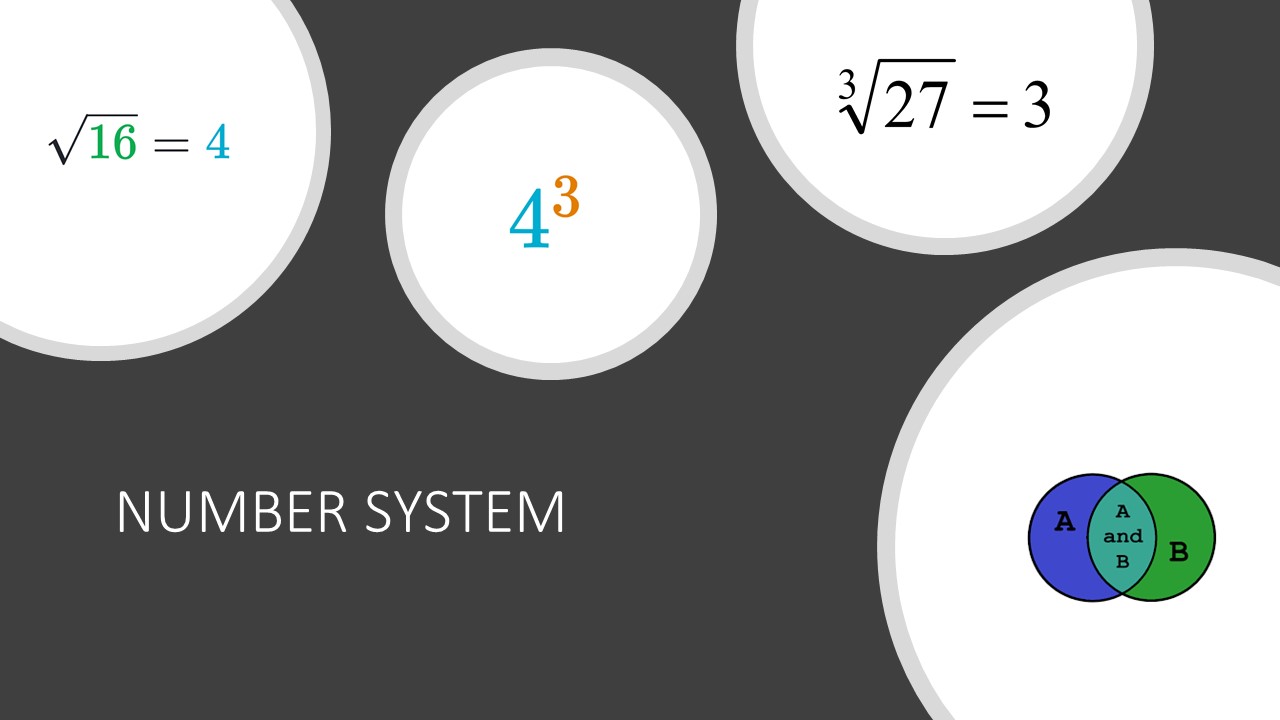STD VIII – NUMBER SYSTEM (Hybrid)
About Course
In this section will learn this following chapters:
1.RATIONAL NUMBERS
2.Exponents
3.Squares and Square Roots
4.Cubes and Cube Roots
5.Playing with Numbers
6.Sets
Last Updated:July 24, 2025
0 (0 Ratings)
Share Course
Page Link
Share on social media

Description
RATIONAL NUMBERS
Numbers that can be expressed in the form pq, where p and q are integers and q ≠ 0, are known as rational numbers. The collection of rational numbers is denoted by Q.
A rational number is a number that can be written as a ratio. That means it can be written as a fraction, in which both the numerator (the number on top) and the denominator (the number on the bottom) are integers
Properties of rational Numbers
Closure
Commutativity (a+b=b+a) and (a x b = b x a) |
Associativity a×(b×c)=(a×b)×c and a+(b+c)=(a+b)+c
Number Line
Every point in a number line, represents a number
Between any 2 rational numbers there exists infinitely many rational numbers
Exponents
Very large numbers, for example, 1685742300000 are difficult to read, understand and compare.
Exponents are shorthand for repeated multiplication of the same thing by itself, and it’s power refers to the number of times it is multiplied.
Squares and Square Roots
In mathematics, students learn about numbers and different operations on them.
A square of an integer is the product of some integer with itself. Similarly, the square root of a number is an integer which when multiplied by itself give this number. In this topic, we will increase our understanding of squares, square roots, and will learn about ways of finding them.
Cubes and Cube Roots
In arithmetic and algebra, the cube of a number n is its third power, the result of the number multiplied by itself twice:
n3 = n × n × n.
It is also the number multiplied by its square:
n3 = n × n2.
Playing with Numbers
Calculations with numbers are done with arithmetical operations, the most familiar being the addition, subtraction, multiplication, division, and exponentiation.
Their study or usage is called arithmetic. The same term may also refer to number theory, the study of the properties of numbers.
Sets
In mathematics, a set is a well-defined collection of distinct objects, considered as an object in its own right. For example, the numbers 2, 4, and 6 are distinct objects when considered separately, but when they are considered collectively they form a single set of size three, written {2,4,6}
Free
Free
Free access this course
-
LevelIntermediate
-
Total Enrolled5
-
Last UpdatedJuly 24, 2025
Hi, Welcome back!
Material Includes
- 🔥 Live Interactive classes with in-class doubt solving
- ⭐ Weekly Test and Quiz with instant tracking for progress
- ⚙️ Revision of the course after testing
- 👋 Fortnightly Parents and Tutor interactions
- 🌷 Expert monitoring of student's learning progress
- 👨👩👧👧 Daily communication over call, whatsapp and mail
- 💻3 hours on-demand video
- ✍4 downloadable resources
- ⌛Access for entire Academic Year
- 📱Access on mobile and Desktop
- 📋Assignments and review of the same
- 💡Tests and Correction by Board paper checkers
- 🏅Certificate of completion and Live tracking with Grade book
Course Duration:
0
Course level:Intermediate
Enrolled:5
About Course
In this section will learn this following chapters:
1.RATIONAL NUMBERS
2.Exponents
3.Squares and Square Roots
4.Cubes and Cube Roots
5.Playing with Numbers
6.Sets
Course Curriculum
EXPONENTS – 2025
-
VIII – EXPONENTS – NUMERICALS BASED ON ALL LAWS AND HOTS – REVISION – FINAL
01:11:37
RATIONAL NUMBERS
What are Rational Numbers
Operations Performed on Rational numbers
Addition
Subtraction
Multiplication
Division
Numerical Word problems
Representation in Decimal
Rational numbers as extension of integers
Decimal representation of
rational numbers
Problem solving using
operations on rational
numbers and decimal
fractions
Fraction as an operator
Reciprocal of a fraction
Multiplication and
division of decimal
fractions
-
RATIONAL NUMBERS – SUPPORT MATERIAL – PROPERTIES OF RATIONAL NUMBERS
03:41 -
RATIONAL NUMBERS – SUPPORT MATERIAL – RATIONAL NUMBER
04:37 -
RATIONAL NUMBERS – SUPPORT MATERIAL – DECIMAL REPRESENTATION OF RATIONAL NUMBERS
04:32 -
RATIONAL NUMBERS – PHYSICAL CLASS – FINDING RATIONAL NUMBERS BETWEEN TWO RATIONAL NUMBERS
11:11 -
RATIONAL NUMBERS – PHYSICAL CLASS – WORD PROBLEMS
20:48 -
NUMBER SYSTEM – PHYSICAL CLASS – ADDITION AND SUBSTRACTION OF RATIONAL NUMBERS
07:20
EXPONENTS
Exponents only natural
numbers.
Laws of exponents
(through observing
patterns to arrive at
generalisation.)
Application of laws of
exponents in simple daily
life problems
-
INDICES – PHYSICAL CLASS – REPRESENTING IN EXPONENTIAL FORM
02:24 -
INDICES – PHYSICAL CLASS – LAWS OF INDICES
06:58 -
INDICES – PHYSICAL CLASS – SIMPLE PROBLEM BASED ON LAWS OF INDICES
09:17 -
EXPONENTS – PHYSICAL CLASS – LAWS OF EXPONENTS AND SIMPLE NUMERICALS
05:36 -
INDICES – PHYSICAL CLASS – IMPORTANT BASE ON LAWS OF INDICES
08:29 -
EXPONENTS – PHYSICAL CLASS – IMPORTANT SUMS BASED ON INDICES
19:41 -
INDICES – PHYSICAL CLASS – IMPORTANT PROOF BASED PROBLEMS BASED ON INDICES
04:15 -
EXPONENTS – PHYSICAL CLASS – NUMERICALS BASED ON EXPONENTS LAWS PART I
14:14 -
EXPONENTS – PHYSICAL CLASS – NUMERICALS BASED ON EXPONENTS LAWS PART II
11:24
SQUARES AND SQUARE ROOTS
Square and Square roots
using factor method and
division method for
numbers containing (a)
no more than total 4 digits
and (b) no more than 2
decimal places
Division Method to find square roots
-
SQUARE AND SQUARE ROOTS – PHYSICAL CLASS – FACTORIZATION METHOD
20:05 -
SQUARE AN SQUARE ROOTS – PHYSICAL CLASS – LONG DIVISION METHOD
20:04 -
SQUARE AND SQUARE ROOTS – PHYSICAL CLASS – HOW TO FIND AND MAKE A NUMBER A PERFECT SQUARE
23:22 -
SQUARE ROOTS – PHYSICAL CLASS – SQUARE ROOT USING PRIME FACTOR METHOD
14:55
CUBES AND CUBES ROOT
Find Cubes and Cube roots of numbers
Only factor Method for numbers containing more than three digits
PLAYING WITH NUMBERS
Writing and
understanding a 2 and 3
digit number in
generalized form (100a +
10b + c , where a, b, c can
be only digit 0-9) and
engaging with various
puzzles Children to solve
and create problems and
puzzles.
Deducing the divisibility
test rules of 2, 3, 5, 9, 10
for a two or three-digit
number expressed in the
general form
-
[PHYSICAL] [JESISHA] – DIVISIBILITY TEST OF GREATER NUMBERS
21:05 -
[PHYSICAL] [JESISHA] – DIVISIBILITY TEST
20:36 -
[PHYSICAL] [JESISHA] FINDING THE UNKNOWN NUMBER
23:02 -
[PHYSICAL] [JESISHA] INTERCHANGABILITY OF DIGITS AND DIVISIBILITY
09:23 -
[PHYSICAL] [JESISHA] STRUTURE OF 2 AND 3 DIGIT NUMBERS AND NUMERICALS
20:13 -
[PHYSICAL] [JESISHA] NUMERICALS BASED ON DIVISIBILITY TEST
21:50
SETS
Union and intersection of
sets
Disjoint set
Complement of a set
-
SETS – SUPPORT MATERIAL – INTRODUCTION TO SETS
02:04 -
SETS – SUPPORT MATERIAL – NULL SET
01:09 -
SETS – SUPPORT MATERIAL – OPERATIONS ON SETS
01:23 -
SETS – SUPPORT MATERIAL – VENN DIAGRAMS
01:10 -
SET – PHYSICAL CLASS – INTRODUCTION OF SETS
16:39 -
SETS – PHYSICAL CLASS – TYPE OF SETS AND CARDINAL NUMBER
16:33 -
SETS – PHYSICAL CLASS – TYPE OF SETS CONTINUE
11:51 -
SETS – PHYSICAL CLASS – UNIVERSAL SETS, DISJOINT SETS AND COMPLEMENT OF A SET
05:43
Student Ratings & Reviews

No Review Yet

